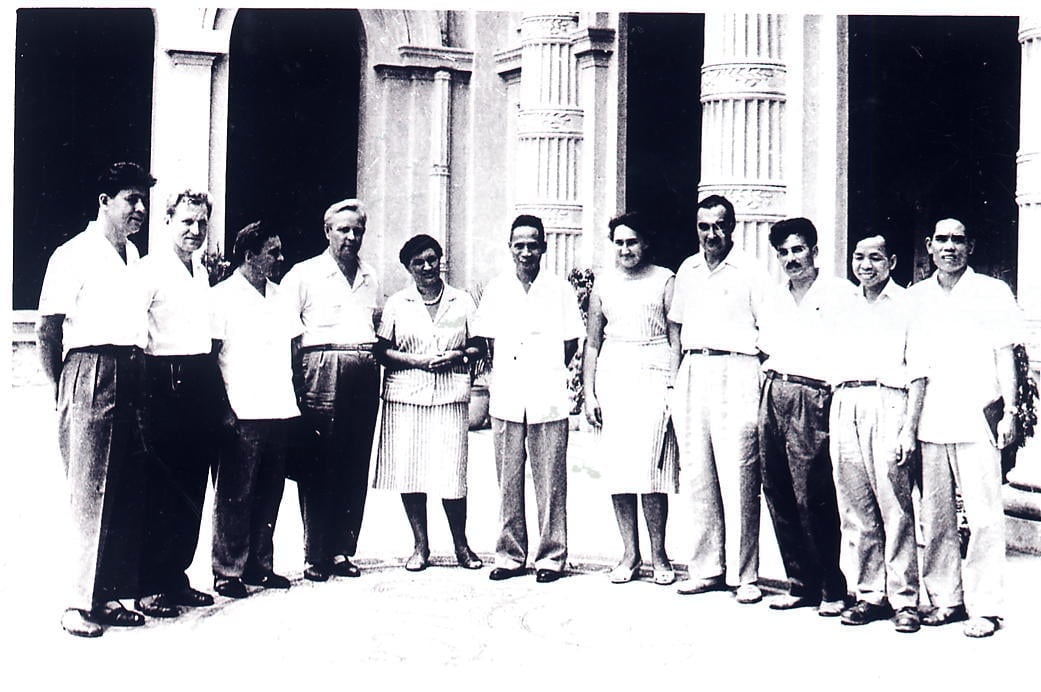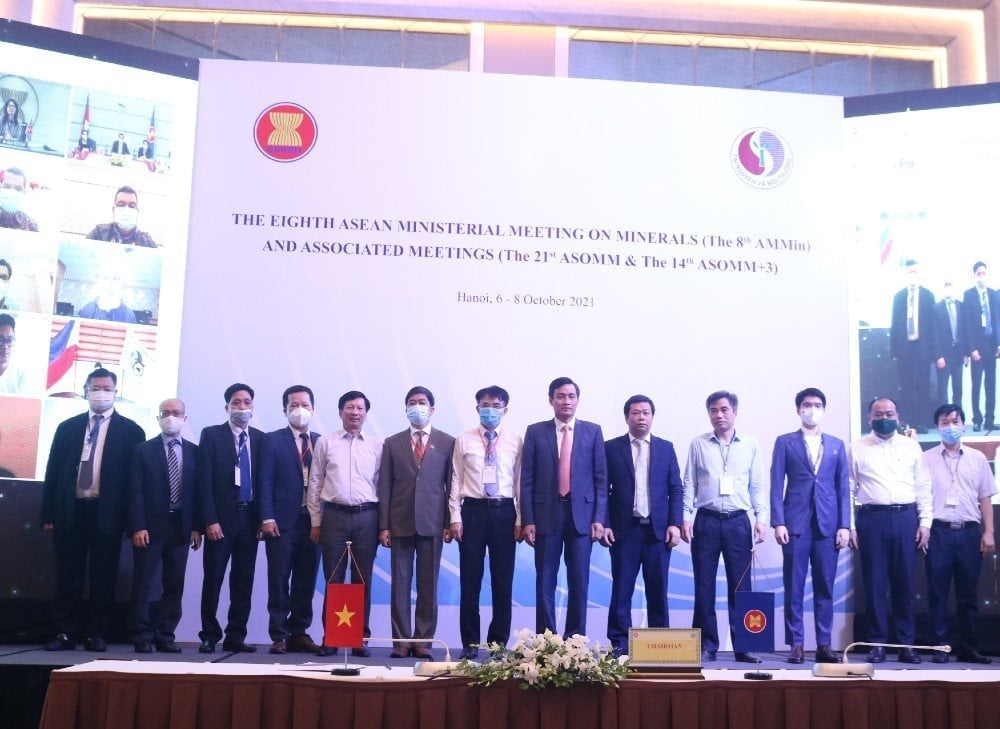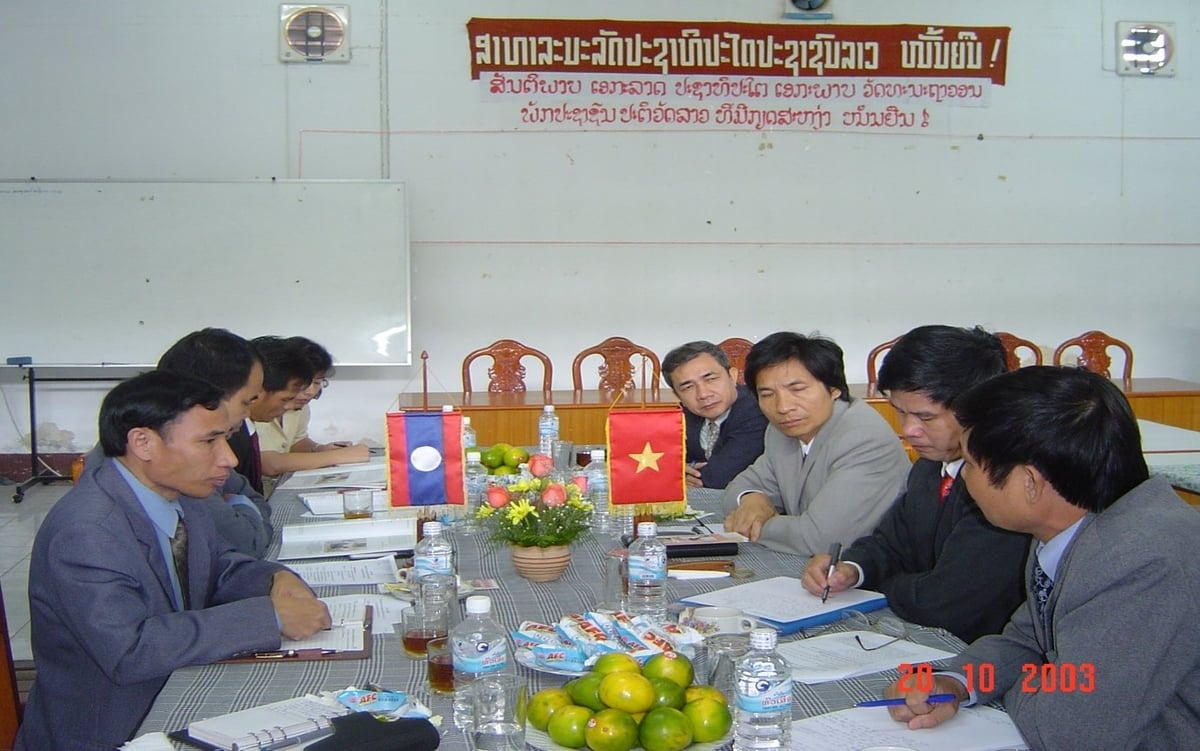December 30, 2025 | 22:36 GMT +7
December 30, 2025 | 22:36 GMT +7
Hotline: 0913.378.918
December 30, 2025 | 22:36 GMT +7
Hotline: 0913.378.918
Since its establishment, the sector has not only advanced in the exploration and survey of domestic mineral resources but also expanded extensive and effective partnerships abroad. By connecting and sharing knowledge with global peers, Vietnam’s geologists have been able to integrate swiftly, mature professionally, and affirm the nation’s standing on the international stage.

In 1962, Prime Minister Pham Van Dong (sixth from the left) received a delegation of Soviet geologists. Photo: Department of Geology and Minerals of Vietnam.
Shortly after peace was restored in northern Vietnam in 1954, the country received substantial assistance from socialist nations, particularly the Soviet Union. Soviet experts not only directly participated in the earliest fundamental geological surveys but also trained Vietnam’s first core generation of geologists. This cooperation laid the foundation for a robust scientific and technical base, opening the way for the sector’s future development.
Beyond bilateral relations, trilateral cooperation among Vietnam, Laos, and Cambodia also became a symbol of enduring friendship. Geologists from the three nations worked side by side like comrades in the same trench, exchanging experiences, sharing research results, and contributing to scientific knowledge of the Indochinese Peninsula. These efforts provided crucial scientific data to support socio-economic development and resource protection in each country.
From these early foundations, Vietnam’s geological sector gradually expanded cooperation with many countries and international organisations. Vietnam became a member of prestigious forums such as the International Union of Geological Sciences (IUGS), the International Geoscience Programme (IGCP), the Coordinating Committee for Geoscience Programmes in East and Southeast Asia (CCOP), and the Coordinating Committee for Pacific Economic Mineral Resources (CPCEMR).

Vietnam further cemented its reputation by hosting major events, including the 8th ASEAN Ministers on Minerals Meeting (AMMin 8) and related conferences in 2021. Photo: Mai Dan.
Dozens of research projects, technical cooperation programmes, technology transfer initiatives, and joint investment ventures have been carried out with partners from Russia, France, Belgium, Germany, the UK, the United States, Canada, Japan, South Korea, Australia, New Zealand, India, China, and ASEAN member states. These collaborations have enabled Vietnamese geologists to access modern technology and advanced research methodologies, strengthening their expertise while broadening the scope of international integration.
Vietnam has also earned international recognition by successfully organising landmark scientific conferences. These include the first and second Indochina Geological Conferences (1986 and 1991), the Roundtable on Mining Law and Investment Development (1992), the Conference on Energy and Mineral Resource Exploration and Development in Vietnam and Neighbouring Regions (1994), and the Joint Scientific Meeting of the Association of Terrestrial Magnetism and Aeronomy and the Society of Solid Earth Geophysics (2001).
In 2011, Vietnam hosted the 11th ASEAN Senior Officials Meeting on Minerals (ASOMM-11), which included all 10 ASEAN member states and dialogue partners and led to the adoption of the ASEAN Minerals Cooperation Action Plan for 2011–2015.
Another milestone was the 15th Geological Congress on Mineral Resources and Energy in Southeast Asia (GEOSEA XV), held in Hanoi in 2018. The event gathered more than 500 domestic and international delegates and not only highlighted Vietnam’s capacity to organise large-scale scientific forums but also reinforced the country’s role as a regional hub for geological cooperation.
Continuing that success, in 2021 Vietnam once again made its mark by hosting AMMin 8 and related meetings, which officially adopted the ASEAN Minerals Cooperation Action Plan Phase 2 (2021–2025) and set out annual priority tasks. This was regarded as a significant step in shaping regional cooperation on mineral resources and laying a solid foundation for subsequent high-level conferences.
According to experts, these gatherings were more than just scientific events; they served as bridges for cooperation, creating opportunities for Vietnam to share research results while absorbing global trends and cutting-edge technologies. “Each international event reaffirms the image of Vietnam’s geological sector as open, dynamic, and ready to collaborate for sustainable development,” one geologist noted.
In its new phase of development, Vietnam’s geological sector continues to diversify and enhance international cooperation in a more practical and effective manner. Large-scale projects have been launched, such as the 1:1,000,000-scale geological map harmonisation project with Laos, Cambodia, Thailand, and Myanmar; lignite gasification studies in the Red River Delta with American and Canadian experts; and uranium ore research and prospecting with Russian geologists.

A meeting between the Department of Geology and Mines of Laos and Vietnam’s Department of Geology and Minerals in Vientiane, 2003. Photo: Department of Geology and Minerals of Vietnam.
Significantly, these cooperation programmes are increasingly linked to environmental protection and the sustainable use of natural resources. This direction not only aligns with global integration requirements but also reflects Vietnam’s long-term commitment to sustainable development.
Looking back at 80 years of progress, international cooperation has been one of the key pillars of Vietnam’s geological achievements. From the early days of support from foreign friends to today’s multilateral and regional partnerships, the sector has demonstrated its capacity to reach outward and integrate with the global scientific community.
Looking ahead, Vietnam’s geological sector will continue to view international cooperation as a vital driver for enhancing research capacity, applying modern technology, and contributing meaningfully to socio-economic development while safeguarding resources and the environment. This is how the sector intends to extend its proud 80-year legacy.
As one expert remarked at an international conference: “The cooperative achievements of the early period not only provided invaluable data but also built trust and forged bonds across generations of geologists in the region. This legacy is priceless for the sustainable future of Vietnam’s geological sector”.
Translated by Linh Linh

(VAN) Located in three former provinces, Nam Dinh, Thai Binh, and Ninh Binh, and now in two provinces, Ninh Binh and Hung Yen, "Red River Delta" is the name of Vietnam's first interprovincial coastal wetland World Biosphere Reserve.
/2025/12/29/1046-1-210728_624.jpg)
(VAN) In 2025, Viet Nam recorded severe and extreme disasters, breaking multiple historical records and causing heavy losses in lives, property, and infrastructure nationwide.

(VAN) Applied technologies, water-saving irrigation is a strategic solution to promote climate-resilient agriculture and strengthen water security in the uplands.
/2025/12/29/3936-3-163422_251.jpg)
(VAN) Can Gio mangrove forest in particular and the entire Can Gio Mangrove Biosphere Reserve in general hold great potential for carbon credits.

(VAN) Chu Pah Rubber has announced its products that comply with the EU Deforestation Regulation (EUDR), affirming its commitment to sustainable production and product origin transparency.

(VAN) Deputy Director Nguyen Hoai Nam stated that a digital data platform will be developed with agricultural sector databases, utilizing AI to help farmers make informed decisions on 'watering correctly, sufficiently, and efficiently.’
/2025/12/29/4841-2-134224_777.jpg)
(VAN) From only about 10 individuals in 2009, the wild elephant population in Dong Nai has recovered to nearly 30 animals after more than 10 years.